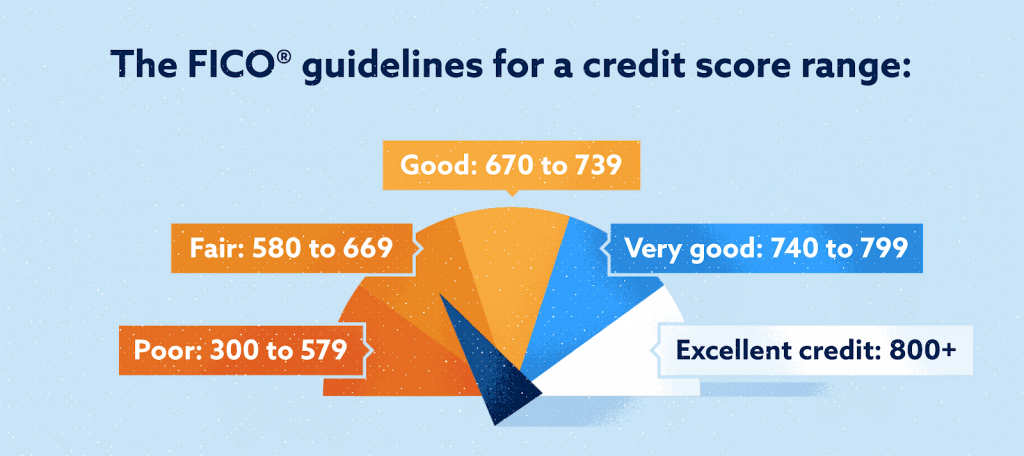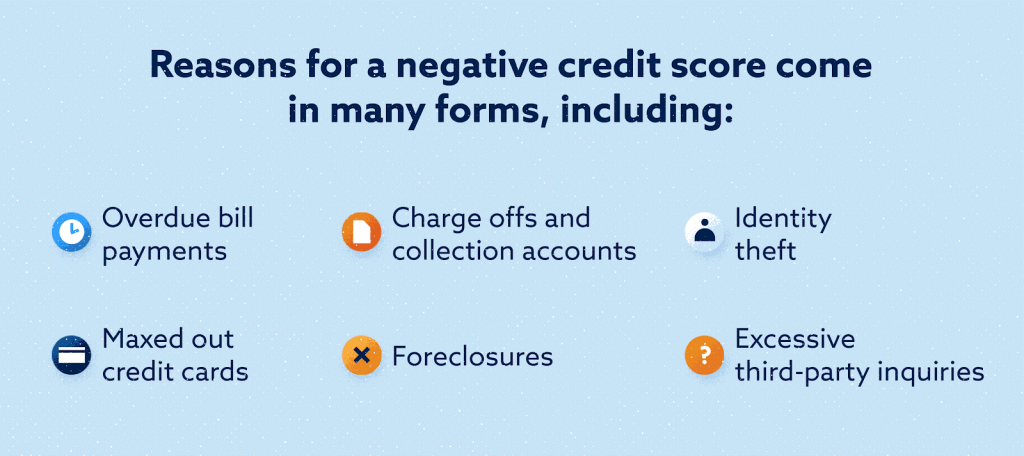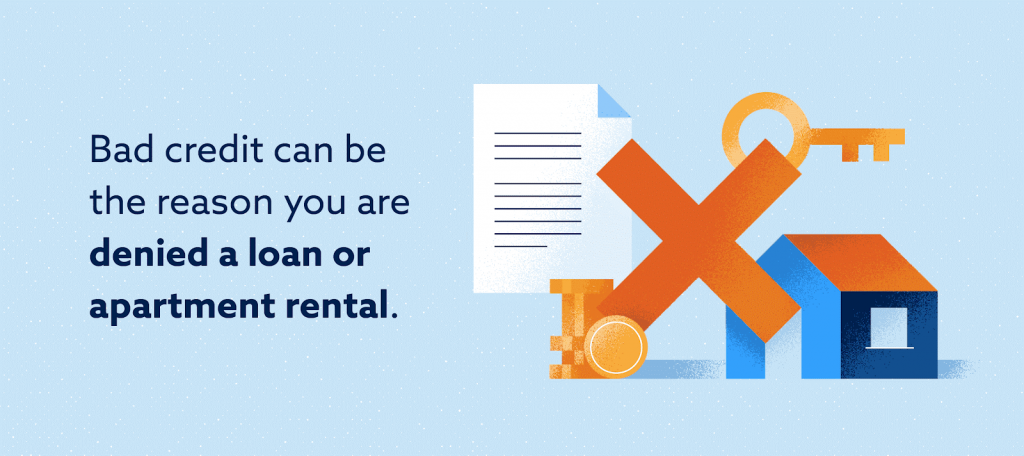What is a bad credit score? How to improve your credit

Generally, a bad credit score is anything below 600. Because it represents your creditworthiness, your score can affect your financial flexibility, and in turn, your lifestyle.
A low credit score can stand between you and your goals. You can get rejected outright — or get approved, but at a much higher interest rate than if your credit score were better. Luckily, your credit score is only a picture of your credit report at that moment and it can change. Let’s explore what causes bad credit and ways to improve it.
- Credit score ranges
- What affects my credit score?
- What to expect with bad credit
- How much does bad credit cost you?
- Tips to improve a bad credit score
- How to check your credit score for free
Credit score ranges
Credit scores typically range from 300 to 850, based on whatever scoring method is used. The higher your credit score is, the better. Each lender determines what it considers a good or bad credit score.
Although there is a difference between a fair credit score and a bad credit score, it’s important to note that many lenders will consider consumers with a score under 600 as credit risks.
The two most common types of credit scores used by lenders are FICO and Vantage Score.
What is a bad FICO score?

The FICO® guidelines for a credit score range are:
- Excellent credit: 800+
- Very good: 740 to 799
- Good: 670 to 739
- Fair: 580 to 669
- Poor: 300 to 579
With a score anywhere in the Poor to Fair range (300 – 669), it may be difficult for you to be approved for certain loans or to be offered good interest rates on others.
What is a bad VantageScore?
The VantageScore guidelines for credit score ranges are:
- Excellent credit: 781 to 850
- Good: 661 to 780
- Fair: 601 to 660
- Poor: 500 to 600
- Very poor: 300 to 499
VantageScores differ slightly in their ranges from FICO scores, however, as with FICO scores, any score below a 600 is considered to be fairly weak.
What is the average credit score?
According to FICO®, as of May 2021 the average American’s score is 711. However, according to the CFPB close to 26 million Americans are considered “credit invisible” — meaning that they possess a credit history so thin that they are “unscorable” and don’t have a credit score.
What negatively affects my credit score?
If you’re wondering why your credit score appears to be so low, or you don’t have a credit score at all, here are several factors that can negatively impact your credit:
- Overdue bill payments
- Maxed out credit cards
- Charge offs and collection accounts
- Foreclosures
- Identity theft
- Excessive third-party inquiries

Each item has its own level of severity and the power to damage your credit score. Combined, their strength can cripple it.
There is a chance that some errors may be contributing to your low credit score. Your credit score is based off of the information in your credit report, which lists personal information, open credit accounts, bill payments on loans and other financial information that’s reported by creditors, lenders or collections agencies.
If you check your credit score and are surprised that it’s so low, you should download a free copy of your credit report from each of the three credit bureaus and make sure that all your information is accurate. If you find inaccurate information, you can dispute it. If the inaccuracies are removed, it may improve your credit score.
Errors on credit reports are not uncommon—over 25 percent of credit reports contain errors. Be sure to check your credit report regularly.
What to expect with bad credit
If you have a credit score of 600 or lower, lenders consider you more of a financial risk and some may even reject you outright.
Lenders will make a decision about the risk they are willing to take in extending credit. Some companies only work with excellent credit, so even someone with a score of 700 could be turned down. If a lender does extend credit to you with a lower credit score, be aware that you’ll likely pay more in interest than someone with a higher credit score.
With a low credit score, you probably won’t qualify for zero percent interest credit cards or personal loans at single-digit interest rates. You’ll face higher auto and mortgage finance rates as well, and you may get stuck paying a utility deposit that someone with a higher score doesn’t have to pay.
How much does bad credit cost you?
Having a poor credit score can lead to many consequences. It communicates to lenders that you have a history of poor borrowing habits and that you are a risky investment. Since you’re considered less creditworthy, lenders will adjust the terms of a contract by applying higher interest rates and other unfavorable terms.
Banks are not the only ones looking at your credit score—many institutions make assumptions about you based on your credit history. Landlords, car dealerships, insurance companies and even potential employers can check your credit.
Poor credit could be the reason for being denied an apartment, not being able to afford a car, increased insurance premiums, or even getting denied a new job.

Tips to improve a bad credit score
If you’re having trouble getting approved for a credit card or loan, you have options to work towards building your credit score.
Consider the following tips:
- Become an authorized user on someone else’s account, and make sure the other user is someone who is responsible with credit.
- Get a cosigner who has great credit. The lender will consider your cosigner jointly responsible for any debt.
- Open a secured account. You can put cash in an account and the issuer will allow you to borrow up to a certain percentage of the money.
- Work to pay off your debt and keep balances low.
- Keep unused credit cards open.
How to check your credit scores for free
There are a few different secure ways you can check your credit scores for free. Most banks offer a feature that allows you to monitor one of your credit scores for free. Additionally, some reputable credit monitoring apps allow you to view your FICO score.
Because credit impacts so much of our lives, a low credit score can be extremely harmful to your financial goals and lifestyle. Fortunately, improving your score is possible. This includes disputing an error, making payments on time and paying down credit card balances.
Cynthia Thaxton has been with us since 2014. She attended The College of William and Mary in Williamsburg, Virginia where she graduated summa cum laude with a degree in International Relations and a minor in Arabic. Cynthia then attended law school at George Mason University School of Law, where she served as Senior Articles Editor of the George Mason Law Review and graduated cum laude. Cynthia is licensed to practice law in Utah, North Carolina and Virginia.
Note: Articles have only been reviewed by the indicated attorney, not written by them. The information provided on this website does not, and is not intended to, act as legal, financial or credit advice; instead, it is for general informational purposes only. Use of, and access to, this website or any of the links or resources contained within the site do not create an attorney-client or fiduciary relationship between the reader, user, or browser and website owner, authors, reviewers, contributors, contributing firms, or their respective agents or employers.
